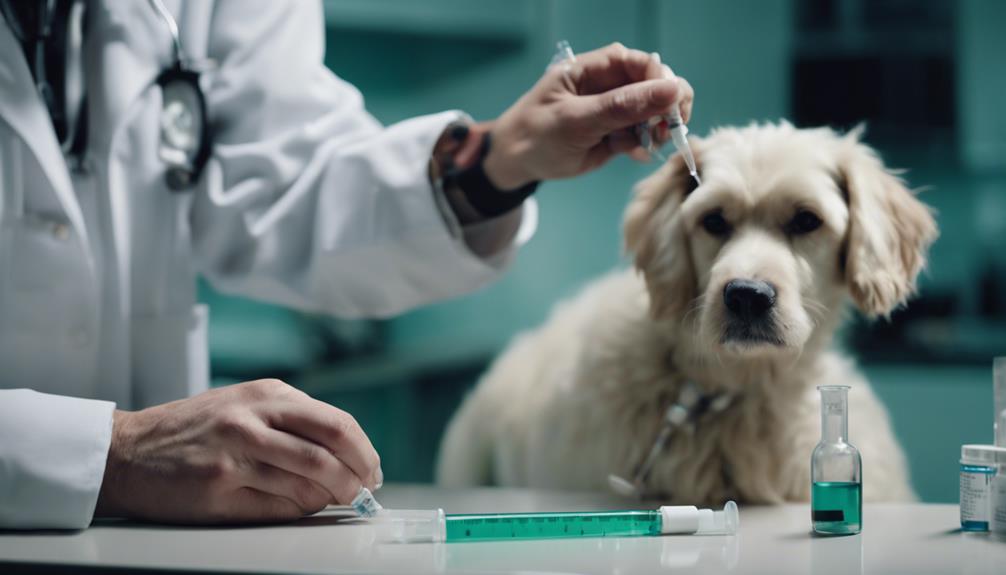Adequan, a pharmaceutical recognized for its efficacy in managing joint diseases in dogs, offers a multifaceted approach to alleviating symptoms associated with conditions like arthritis. Its mechanism of action involving joint protection and inflammation reduction has positioned it as a noteworthy therapeutic option in veterinary medicine.
However, as with any medication, understanding the appropriate dosage and potential side effects is crucial for pet owners seeking to enhance their canine companions' quality of life. The intricacies of Adequan's administration and the possible adverse reactions it may elicit warrant a closer examination to ensure informed decisions regarding its utilization in canine care.
Key Takeaways
- Adequan effectively manages signs of non-infectious degenerative arthritis in dogs.
- Dosage is typically 0.02 mg/lb twice weekly for up to a month.
- Uncommon side effects include temporary bleeding, swelling, and pain at the injection site.
- Adequan is safe for dogs of all ages, breeds, and sizes, with minimal side effects.
Adequan for Dogs: Key Information
In veterinary medicine, Adequan for dogs serves as a key treatment for joint diseases like arthritis, providing essential support in managing signs of non-infectious degenerative arthritis. Adequan, a polysulfated glycosaminoglycan (PSGAG), offers a multifaceted approach by protecting joints, reducing pain and inflammation, stimulating cartilage activity, and improving synovial fluid.
A pivotal 2007 study demonstrated the efficacy of PSGAG in reducing lameness in dogs with osteoarthritis. FDA-approved for managing non-infectious degenerative arthritis in dogs, Adequan is typically administered via injections given by a veterinarian, with dosages usually at 0.02 milligrams per pound of body weight, twice weekly for up to a month.
While not a cure, Adequan can alleviate symptoms for extended periods and is often used in conjunction with other treatments to slow joint degeneration.
Mechanism of Action
The mechanism of action of Adequan in dogs involves a comprehensive approach aimed at protecting joints, reducing pain, and inflammation, stimulating cartilage activity, and enhancing synovial fluid quality.
Polysulfated glycosaminoglycan (PSGAG), the active ingredient in Adequan, plays a crucial role in maintaining joint health. PSGAG helps to inhibit enzymes that break down cartilage, thus preserving joint integrity. Additionally, it promotes the production of proteoglycans and glycosaminoglycans, essential components of healthy cartilage.
By reducing inflammation and pain, Adequan aids in improving joint function and mobility. Moreover, enhancing the quality of synovial fluid lubricates the joints, reducing friction and further protecting them from degeneration.
This multifaceted approach makes Adequan a valuable treatment option for dogs suffering from joint diseases like arthritis.
Efficacy in Osteoarthritis

Demonstrating significant efficacy in managing osteoarthritis, Adequan stands out as a valuable treatment option for dogs facing this degenerative joint disease. Studies have shown that polysulfated glycosaminoglycan (PSGAG) present in Adequan can effectively reduce lameness in dogs with osteoarthritis.
By protecting joints, reducing pain and inflammation, stimulating cartilage activity, and improving synovial fluid quality, Adequan helps alleviate the symptoms associated with this condition. While it does not provide a cure, Adequan can offer relief for weeks to months, slowing the progression of joint degeneration when used early.
This treatment is often used in combination with other therapies to manage osteoarthritis effectively in dogs, making it a vital component in the comprehensive care of arthritic canines.
FDA Approval and Uses
Adequan's approval by the FDA underscores its recognized efficacy and safety in managing osteoarthritis in dogs, positioning it as a trusted treatment option within veterinary medicine.
- FDA approval signifies Adequan's adherence to rigorous safety and efficacy standards.
- Adequan is specifically indicated for managing signs of non-infectious degenerative arthritis in dogs.
- The approval highlights Adequan as a reliable choice for veterinarians seeking an effective treatment for osteoarthritis in canine patients.
Administration and Dosage

Optimizing the efficacy of polysulfated glycosaminoglycan (PSGAG) in veterinary care involves precise administration and dosage considerations. Adequan injections are typically administered by a veterinarian either in the clinic or at home under proper guidance. It is crucial to follow the prescribed dosage regimen to ensure the best outcomes for your dog's joint health. The standard dosage is usually 0.02 milligrams per pound of body weight, given twice weekly for up to a month. While Adequan does not offer a cure for joint diseases, it can effectively alleviate symptoms for an extended period. Combining Adequan with other treatments can further enhance its benefits.
| Dosage | Frequency | Duration |
|---|---|---|
| 0.02 mg/lb body weight | Twice weekly | Up to a month |
Dosage Guidelines
To ensure proper administration and effectiveness of Adequan in dogs, adherence to appropriate dosage guidelines is essential for optimizing joint health outcomes.
- Adequan dosage is typically 0.02 milligrams per pound of body weight.
- The injections are usually given twice weekly for up to a month.
- It is crucial to follow the prescribed dosage schedule to achieve the desired therapeutic effects and support joint health in dogs effectively.
Symptom Alleviation Duration

For dogs receiving Adequan injections, the duration of symptom alleviation varies based on individual response and the severity of joint disease. Some dogs may experience relief for weeks, while others may have relief for several months. Typically, the initial treatment protocol involves two injections per week for up to four weeks. Following this loading period, some dogs may only require periodic injections to maintain symptom relief, while others may need more frequent administration.
It is essential for pet owners to closely monitor their dog's response to Adequan and work with their veterinarian to determine the most effective dosing schedule for long-term management of joint disease symptoms. Regular veterinary check-ups can help assess the ongoing effectiveness of Adequan therapy.
Combining With Other Treatments
When addressing joint diseases in dogs, integrating Adequan injections with complementary therapies can enhance the overall management of symptoms and promote better joint health outcomes. This combined approach can target various aspects of joint health and provide a more comprehensive treatment plan for the affected canine.
Some beneficial complementary treatments to consider alongside Adequan injections include:
- Physical therapy to improve joint mobility and muscle strength.
- Nutritional supplements like glucosamine and omega-3 fatty acids to support cartilage health.
- Weight management to reduce stress on the joints and improve overall mobility and comfort for the dog.
Common Side Effects

Uncommonly, Adequan for dogs may elicit temporary side effects such as bleeding, swelling, pain at the injection site, and diarrhea. While most side effects are mild and self-limiting, it is essential to monitor your dog after administration.
Bleeding or swelling at the injection site is typically minor and resolves on its own. Some dogs may experience temporary discomfort or pain at the site of injection, which can usually be managed with rest and monitored closely.
Additionally, gastrointestinal upset, like diarrhea, may occur but often subsides without intervention. If these side effects persist or worsen, contacting your veterinarian for guidance is recommended to ensure your dog's well-being and comfort.
Handling Side Effects
In managing side effects of Adequan for dogs, prompt monitoring and appropriate intervention are crucial for ensuring your dog's comfort and well-being. While most side effects of Adequan are mild and temporary, it is essential to address any concerns promptly.
Here are some key points to consider:
- Monitor your dog closely after each Adequan injection for any unusual symptoms.
- Contact your veterinarian immediately if you notice persistent or severe side effects.
- Follow your vet's recommendations for managing side effects to ensure your dog's safety and well-being.
Tolerance and Safety

Exploring the tolerability and safety profile of Adequan in dogs is essential for ensuring optimal management of joint diseases such as arthritis. Adequan is generally well-tolerated by dogs, with minimal side effects reported. Most adverse reactions, such as temporary bleeding, swelling, pain at the injection site, and diarrhea, are uncommon and typically resolve without discontinuing the medication. However, some dogs may not tolerate Adequan well, and it is crucial to monitor for any signs of intolerance. Ensuring the safety of your pet during treatment is paramount. Below is a table summarizing the tolerance and safety aspects of Adequan for dogs:
| Aspect | Details |
|---|---|
| Common Side Effects | Temporary bleeding, swelling, pain, diarrhea |
| Tolerance in Dogs | Generally well-tolerated with minimal adverse effects |
| Monitoring | Watch for signs of intolerance during treatment |
| Safety Considerations | Report any unusual symptoms to the veterinarian promptly |
Warnings and Precautions
When considering the use of Adequan for dogs, it is important to be aware of specific warnings and precautions to ensure the safety and efficacy of the treatment.
- Safe for dogs of all ages, breeds, and sizes.
- Not researched in pregnant or lactating dogs; caution advised in dogs with kidney or liver disease.
- Avoid in dogs with known or suspected bleeding disorders due to its heparinoid properties.
Conclusion
In conclusion, Adequan, a pharmaceutical containing PSGAG, is an effective option for managing joint diseases in dogs, particularly osteoarthritis.
Its multifaceted mechanism of action provides joint protection, pain relief, and cartilage stimulation.
With FDA approval for non-infectious degenerative arthritis, Adequan's prescribed dosage regimen and potential to alleviate symptoms make it a valuable tool in slowing joint degeneration when used in conjunction with other treatments.




